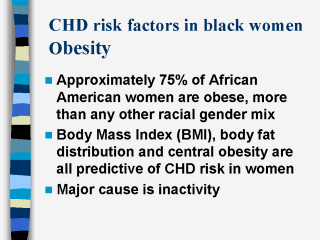 |
One factor that contributes to
the high rate of hypertension and diabetes as well as to the development of CHD in African
American Women is obesity (20). Body mass index (BMI) and body fat distribution are both
predictive of CHD risk in women. In addition, central obesity is associated with various
metabolic problems including glucose intolerance, hyperlipidemia and hypertension. The
Nurses Health Study demonstrated a strong positive relationship between obesity and risk
of CHD. In 14 years of follow-up, women who gained the most weight were at the greatest
risk for CHD development (20). Given their prevalence of obesity, this is particularly
worrisome data for African American women. The ARIC study reported that approximately 75%
of African American women are obese (10). According to the ARIC data, obesity is more
prevalent in black women than in any other racial/gender mix group studied (10). A major
contributing factor to the development of obesity is physical activity. Physical activity
is inversely associated with the risk of death and is an independent risk factor for the
development of CHD (17). Increased physical activity is associated with a lower risk of
CHD. The metabolic benefits of physical activity is believed to relate to elevated HDL
cholesterol and lipoprotein lipase activity, decreased low density lipoprotein (LDL)
cholesterol, fibrinogen level and platelet aggregation. In addition, body weight, blood
pressure and glucose tolerance are positively affected (10). According to the Behavioral
Risk Factor Study, an alarming 43% of black women over the age of 18 reported no leisure
time physical activity compared to 28% of white American women (17). While measuring only
leisure time physical activity precludes the inclusion of nonleisure energy expenditure,
the lack of leisure activity in African American women undoubtedly contributes to their
development of obesity and enhances their risk of developing CHD. |
